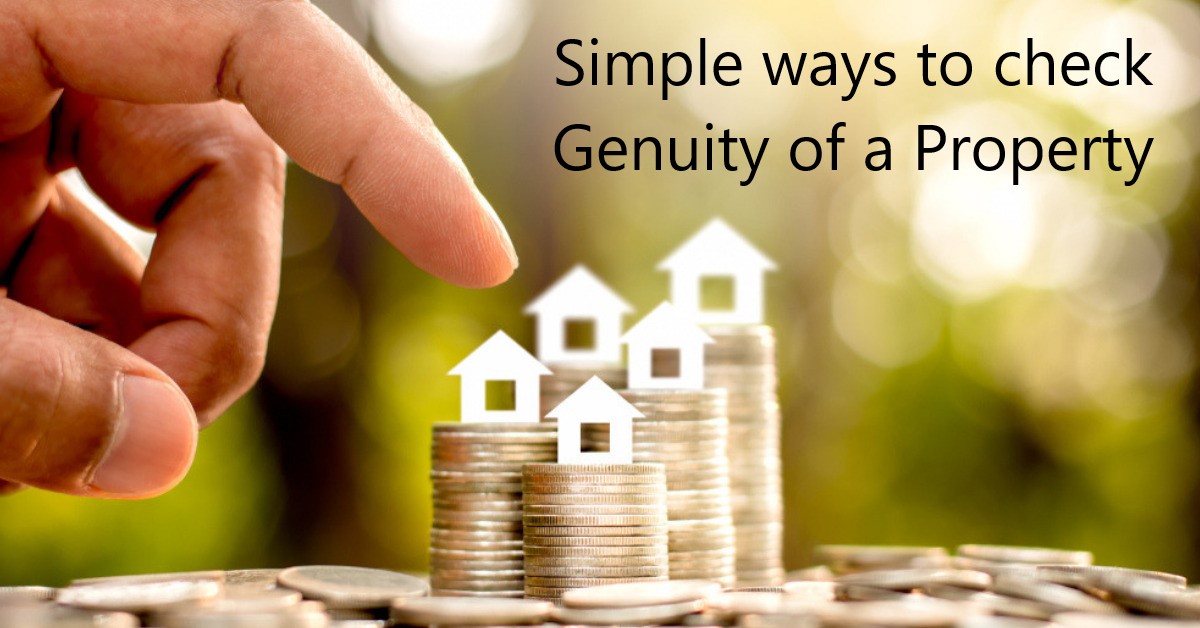Simple ways to check Genuity of a Property
Read latest blogs and articles from Housystan

The Information mentioned here was last updated on:
29/1/2026Simple Ways to Check the Genuity of a Property
Buying a property is a significant investment, and ensuring the property's authenticity is crucial to avoiding potential scams and financial pitfalls. With real estate transactions, thorough due diligence is essential, especially in today’s complex market. Here, we delve into simple yet effective ways to verify the genuity of a property, which can help you make sound decisions.
Understanding Property Titles and Ownership
- Verified Tenants/Buyers
- Unlimited Property Listing
- Zero subscription/charges fee
The first step in verifying a property's authenticity is understanding its title and ownership. This is crucial, as the title determines the buyer’s legal rights to the property.
Check the Title Deed
The title deed is the most critical document proving ownership. It contains details like the owner's name, property description, and the rights associated with the property. Ensure that the title deed is original and verify it with the local land registry office to confirm its authenticity. Look out for any irregularities or signs of tampering that might indicate a counterfeit document.
Trace the Ownership History
Understanding the ownership history can reveal any potential legal disputes or encumbrances. It is advisable to trace the ownership history for at least the past 30 years. This can be done by examining previous title deeds and ensuring each transfer of ownership was legal and recorded. Any gap or inconsistency should be a red flag.
Confirming Property Legality and Approvals
Beyond verifying ownership, it's essential to ensure that the property is legal and has the required government approvals.
Verify Land Use and Zoning Laws
Different areas are designated for residential, commercial, agricultural, or industrial use. Check with local authorities to ensure that the property complies with zoning laws and that its current use is legal. This is particularly important if you plan to develop or modify the property.
Check for Building Approval and Permits
For built properties, verify that all necessary building permits and approvals are in place. This includes approval from the local municipal body, environmental clearances, and any other relevant permissions. Any structure without these can be subject to demolition or fines.
Survey and Property Boundaries
Knowing the exact boundaries and measurements of the property is crucial to avoid encroachments or disputes with neighbors.
Conduct a Land Survey
Hiring a professional land surveyor provides an accurate diagram of the property, including its dimensions and boundaries. A surveyor can highlight discrepancies between the actual boundary lines and those listed in the title deed. This step is particularly advisable for larger properties or those situated in disputed areas.
Compare Physical Inspection with Official Records
Once you have the survey, compare it against municipal records to ensure they match. Conduct a physical inspection of the property to spot any unauthorized constructions or modifications that may differ from the approved plans.
Financial Clearances and Liens
Investigating any financial claims or liens against the property is a necessary step in protecting your investment.
Check for Outstanding Mortgages and Loans
Determine whether the property is being used as collateral for any loans by checking with relevant financial institutions. A property with pending mortgages can lead to complicated legal situations if the seller defaults on payments.
Investigate Legal Disputes and Liens
Look up any legal disputes, pending litigations, or liens against the property. These can be discovered by consulting with a property lawyer or through a local court records search. Disputes can significantly delay or derail property transactions, especially if they involve ownership claims.
Additional Validation Methods
In addition to official documentation and professional consultations, employing additional validation methods can provide an extra layer of security.
Use Trusted Real Estate Platforms
Opt for established and reputable real estate platforms that offer secure transactions and verified listings. These platforms often conduct preliminary checks to ensure the genuity of properties listed on their site.
Engage a Professional Real Estate Agent or Lawyer
Hiring an experienced real estate agent or lawyer can provide valuable insights and peace of mind. They have the expertise to navigate potential pitfalls and ensure all legal aspects are covered.
Obtain an Encumbrance Certificate
An encumbrance certificate verifies that a property is free from any legal mortgages or claims. This document is available from the sub-registrar's office and helps confirm that the property is not financially encumbered.
Performing Background Checks on Sellers
Especially in private deals, confirming the seller’s background can be a critical component of your due diligence.
Verify Seller’s Identity and Legal Standing
Ensure the seller’s identity matches official records, such as government-issued ID and property documents. Check for any previous legal disputes or complaints that might indicate fraudulent activity.
Seek Testimonials and Independent Reviews
Testimonials from previous buyers and reviews from independent sources can provide insights into a seller’s trustworthiness and past dealings.
Using Technology to Authenticate Property
The digital age has ushered in new technologies that aid in verifying property authenticity, offering additional tools for buyers.
Geographic Information System (GIS) Tools
GIS tools allow users to access comprehensive maps and property data online, including boundaries, ownership, and land use. These can be invaluable in cross-referencing information with official documents.
Blockchain for Property Registration
Some regions are adopting blockchain technology for property registration, providing a transparent and immutable chain of title records. While not universally available, this can be a substantial advantage where applicable.
Conclusion
Ensuring the genuity of a property involves multiple layers of verification, from legal documentation to personal and technological checks. By thoroughly investigating each aspect, from ownership history to financial claims, potential buyers can safeguard their investments and avoid costly pitfalls. Employing both traditional methods and modern technologies offers the broadest defense against fraud and misunderstanding in the real estate market.